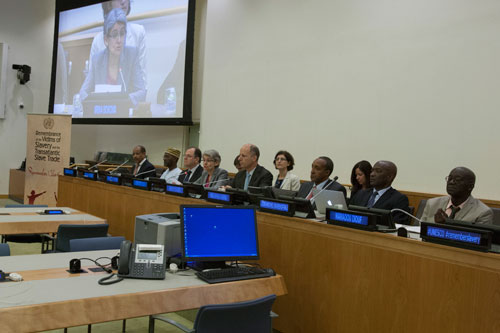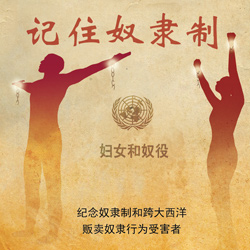
2015 Remembrance Programme
"Women and Slavery"
This year’s theme, “Women and Slavery pays tribute to the many enslaved women who endured unbearable hardships, including sexual exploitation, as well as those who fought for freedom from slavery and advocated for its abolition. The theme also celebrates the strength of enslaved women, many of whom succeeded in transmitting their African culture to their descendants despite the many abuses that they had to endure.
It is estimated that one third of the approximately 15 million people who were deported from Africa through the Transatlantic Slave Trade were women. Enslaved women carried a triple burden. In addition to enduring the harsh conditions of forced labour as a slave, they experienced extreme forms of discrimination and exploitation as a result of their gender and the colour of their skin.
Initially, slaveholders paid little attention to the reproductive role of enslaved women. They preferred to pay for new slaves from Africa than assume the costs of raising enslaved children. As the abolition of the slave trade approached, the import of slaves from Africa soared. However, after the Abolition of the Slave Trade Act entered into force in 1807 in the British Empire, the population of slaves declined. This led to increased labour demands on the enslaved populations.
Although the pressure to increase the productivity of enslaved labour impacted both men and women, slave holders in some locations started to develop practices regarding female slaves to increase the slave population, resulting in sexual exploitation of enslaved women. These practices created conflicts that became an important element that motivated the resistance of female slaves.
Women resisted slavery in many different ways. They developed skills and tried to preserve the dignity and unity of their communities. Some of them became the concubines of their masters or married a free man in the hope of gaining freedom for themselves and their children. Others became spiritual leaders or participated in the revolts and insurrections as well as the legal battles to be free. They had to endure prostitution, rape, torture and sometimes death.
In many places, they participated in the fight against the brutal slavery system which considered slaves as ‘movable property’. They paid a heavy price but their stories remain relatively unknown. Enslaved women were muted by the slavery system that intended to make all slaves anonymous, voiceless and cultureless. This injustice underlines the need to remember the victims of slavery and highlight their humanity.
This year’s theme, Women and Slavery, is a testament to the strength of enslaved women that many succeeded in transmitting their African culture to their descendants in spite of the hardships of forced labour and sexual exploitation that they had to endure. It is no surprise, that their fight for freedom from slavery also influenced the fight for women’s rights that started in the 19th century.
Message of the United Nations Secretary-General | Calendar of events | Promotional materials
Message of the United Nations Secretary-General
Over the course of more than four centuries, some 15 million Africans were taken from their homes across Africa and transported by force to the Americas. The number of people purchased by slave traders was even higher. Those slaves who survived were bought and sold, stripped of all dignity, denied all human rights. Even their children could be taken from them and sold for the profit of their “owners”. The Transatlantic slave trade remains a monstrous crime and a stain on human history.
This year’s Day of Remembrance pays particular tribute to the many women who suffered and died during the slave trade. They experienced appalling violence, including sexual and reproductive enslavement, forced prostitution, repeated sexual assault, as well as forced childbearing and the sale of their own children.
Yet women slaves played a key role in maintaining the dignity of their communities. Too often their leadership and brave resistance have been underestimated or forgotten.
Tragically, slavery has still not ended. Slavery stubbornly persists in many parts of the world, in the form of forced labour, trafficking, sexual exploitation or captivity in slavery-like conditions. These despicable practices could not exist without deep-seated racism. It is absolutely vital that the dangers inherent in racism are made crystal clear to all. The Department of Public Information’s Remember Slavery Programme educates about the Transatlantic slave trade and how intolerance can easily shift from an attitude into acts of hatred and violence.
To mark this International Day, I will unveil a permanent memorial at United Nations Headquarters in New York to honour the victims of slavery and the Transatlantic slave trade. Built on the Visitors Plaza, the “Ark of Return” will bring home to people from around the world the terrible legacy of the slave trade. It will help us heal as we remember the past and honour the victims.
On this important Day of Remembrance, I call for a renewal of our commitment to end modern slavery, so our children will live in a world free of racism and prejudice with equal opportunity and rights for all.
Ban Ki-moon
Calendar of Events
In 2015, in addition to the formal annual observance of the International Day, during the week of 25 March, a series of worldwide commemorative activities were held throughout the year. Events included a solemn ceremony at the UN, film screenings, cultural events, discussion series and exhibitions both at the UN and in other countries.

Irina Bokova (on screen and fourth from left on dais), Director-General of UNESCO, speaks at the event. On her left is Maher Nasser, Officer-in-charge of DPI.
"Round Table Discussion on the General History of Africa: Learning and Teaching about African Heritage"
Friday 10 July, from 10:00 a.m. to 12:00 p.m. United Nations, Conference Room 3. New York
Article: "High-level Panel Discussion Highlights the General History of Africa Project"
General Assembly Commemorative Meeting
Wednesday, 25 March 2015, 3:00 pm, General Assembly Hall, United Nations, New York
Archived webcast videos
- International Day of Remembrance of the Victims of Slavery and the Transatlantic Slave Trade - General Assembly, 83rd Plenary meeting (English version)
- Ban Ki-moon on International Day of Remembrance of the Victims of Slavery and the Transatlantic Slave Trade - General Assembly, 83rd Plenary meeting
- President of the General Assembly, Sam K. Kutesa on International Day of Remembrance of the Victims of Slavery and the Transatlantic Slave Trade - General Assembly, 83rd Plenary meeting
Meetings Coverage
- ‘Speakers Draw Attention to Substantial Contributions of Enslaved Women at General Assembly Event Commemorating Victims of Slavery’ (25 March 2015)
NGO Briefing: “Women and Slavery: its impact on women’s rights today’
Thursday, 26 March, 2015, 11:00 am-1:00 pm, United Nations, Economic and Social Council Chamber, New York
Student Global Video Conference
Friday, 27 March 2015, 9:30 am, United Nations, Conference Room 2, New York
Other New York Events
Screening of the film “Queen Nanny: Legendary Maroon Chieftainess”
In partnership with the Permanent Mission of Jamaica to the United Nations, the United Nations Remember Slavery Programme hosted the Premiere screening of “Queen Nanny: Legendary Maroons Chieftainess” by Roy T. Anderson on 19 October 2015 from 6:30 p.m. to 8:30 p.m. in ECOSOC Chamber. This documentary film shed light on the warrior chieftainess of the Jamaican Maroons, who led a band of former enslaved Africans in the rugged mountains of Jamaica to a decisive victory over the British army during the early to mid-18th century.
Association for the Study of African American Life and History (ASALH) Centennial Annual Conference
From 23 to 27 September, the United Nations Remember Slavery Programme held briefings at the ASALH Centennial Annual Conference in Atlanta, GA, in partnership with the National Park Service, Underground Railroad Network to Freedom Programme Underground Railroad Network to Freedom Programme.
Exhibit "Women and Slavery: Telling Their Stories"
Panel Discussion "Truth: Women, Creativity and Memory of Slavery"
The United Nations Remember Slavery Programme in partnership with Fordham University held a roundtable discussion, Truth: Women, Creativity and Memory of Slavery on 5 October 2015 from 6:00 p.m. to 8:00 p.m. at Fordham University School of Law, 150 West 62nd Street, New York, NY 10023. The panel explored the many ways enslaved women throughout the African diaspora used their artistic voice to express themselves, endure trials, and survive - and to liberate both themselves and their people. The panel also examined what these incredible women can teach the contemporary world about the experiences of slavery and the emancipating power of creativity.
Promotional materials for the 2015 commemoration
|
|
|
|
|
|
 Russian |
 Spanish |
 Kiswahili |
|





